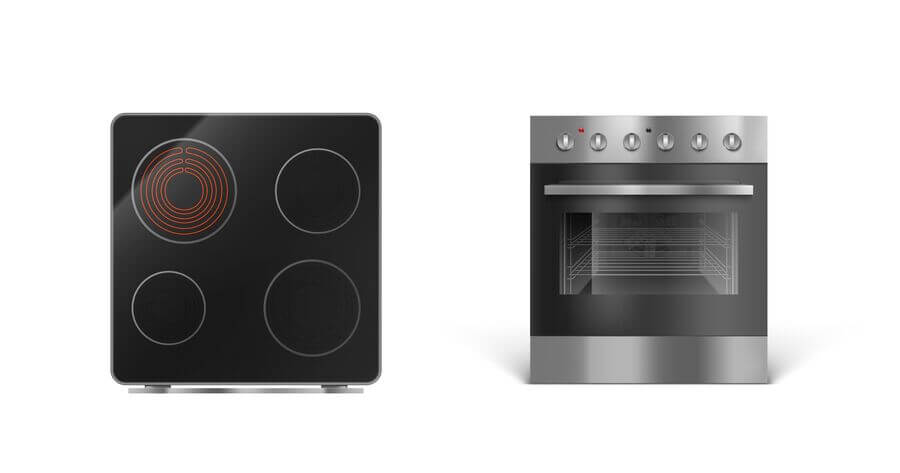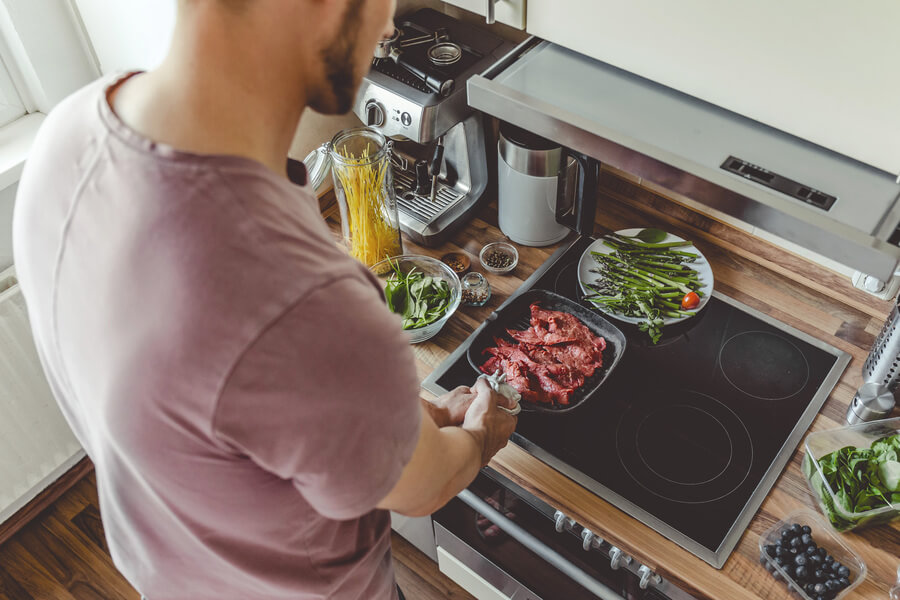Glass top stoves have become a popular choice in modern kitchens due to their sleek and elegant design. They provide a smooth, flat cooking surface that’s easy to clean and maintain. However, like any other appliance, glass top stoves can experience issues, including the burner turning on and off unexpectedly.

This problem can be frustrating and affect your cooking experience. In this article, we’ll explore the various causes of a glass-top stove burner turning on and off and provide practical solutions to address these issues.
Faulty or Worn-out Burner Element
One of the primary reasons for a glass top stove burner intermittently turning on and off is a faulty or worn-out burner element. Over time, these elements can deteriorate due to heat exposure and usage. This can lead to erratic heating patterns, including turning on and off without your command.
Solution: Replace the faulty burner element
To address this issue, you’ll need to replace the problematic burner element. First, unplug your stove from the electrical outlet or turn off the circuit breaker. Then, carefully lift and remove the malfunctioning element by gently pulling it out from its socket.
Consult your stove’s manual or the manufacturer’s website to find the right replacement element for your specific model. Once you have the new element, slide it into the socket and secure it. Ensure it’s connected properly, and your burner should function consistently again.
Loose or Damaged Wiring
Another common cause of a glass top stove burner cycling on and off is loose or damaged wiring. The electrical connections within the stove are critical for maintaining a stable power supply to the burner element. Loose or frayed wires can lead to inconsistent heating.
Solution: Inspect and repair wiring connections
To address this issue, you’ll need to inspect the wiring connections beneath the glass top. Remember to unplug the stove or turn off the circuit breaker before performing any repairs. Carefully remove the glass top by following the instructions in your stove’s manual.
Once exposed, check for any loose or damaged wires. If you find any, repair or replace them as necessary. It’s essential to handle wiring with care and, if needed, seek professional assistance to ensure the safety and proper reassembly of your stove.
Power Supply Issues
Sometimes, the problem isn’t with the stove but the power supply. Power surges, tripped circuit breakers, or loose electrical connections can disrupt the flow of electricity to the stove, causing burners to turn on and off unexpectedly.
Solution: Check the circuit breaker and electrical connections
Start by examining your home’s circuit breaker. If you notice that the stove’s circuit has tripped, reset it. In the event of frequent tripping, consult an electrician to investigate potential issues with your electrical system.
Additionally, inspect the stove’s plug and the outlet for loose connections. Ensure they are secure and there is no visible damage to the power cord. If you suspect power supply issues, it’s advisable to consult an electrician to diagnose and resolve any problems in your home’s electrical infrastructure.
Control Panel Malfunction
Sometimes, the culprit behind your glass top stove burner turning on and off might be a malfunctioning control panel. The control panel is responsible for regulating the heat and ensuring that the burner operates as per your settings. When it malfunctions, it can result in erratic burner behavior.
Solution: Repair or replace the control panel
If you suspect a control panel malfunction, it’s essential to address it promptly. Begin by disconnecting your stove from the power source. Consult your stove’s manual or the manufacturer for guidance on troubleshooting the control panel.
In some cases, a simple reset might resolve the issue. However, if the problem persists, you should contact a qualified appliance repair technician to diagnose and repair the control panel. If the control panel is beyond repair, replacement might be necessary to restore the stove’s functionality.
Overheating Protection
Many glass top stoves have built-in safety features, including overheating protection. If the stove detects excessive heat, it may automatically turn off the burner to prevent damage or fire.
Solution: Allow the stove to cool down and reset
In cases where your glass top stove burner intermittently turns off, especially during high-temperature cooking, it could be due to the stove’s overheating protection. When this occurs, the solution is relatively simple: allow the stove to cool down.
This safety feature will automatically reset once the stove’s temperature returns to a safe level. However, if this happens frequently, it may be worth reviewing your cooking habits and ensuring proper ventilation in your kitchen to prevent overheating.
Cookware Not Suitable for Induction
Glass top stoves often use induction heating, which requires induction-compatible cookware. Using cookware unsuitable for induction cooking can result in inconsistent heating, causing the burner to turn on and off unexpectedly.

Solution: Use induction-compatible cookware
To resolve this issue, use the right cookware for your glass-top stove. Induction-compatible cookware is designed with a ferromagnetic bottom to interact with the stove’s magnetic field for efficient heating.
Look for cookware labeled as “induction-ready,” or test your existing pots and pans by checking if a magnet sticks to their bottom. If not, it’s time to invest in suitable cookware to achieve consistent heating and prevent the burner from cycling on and off.
Spillage and Residue
Accumulated spills, residue, and food particles on the glass top can disrupt the burner’s operation. If these contaminants come into contact with the burner’s sensor, they can cause it to cycle on and off irregularly.
Solution: Clean the glass top thoroughly
Regular cleaning is essential to prevent this issue. After each use, allow the glass top to cool down, and use a glass-top stove cleaner or a mixture of white vinegar and water to remove any spills or residue.
Scrub gently with a non-abrasive sponge or cloth to ensure the surface is clean and debris-free. By maintaining a pristine cooking surface, you can avoid sensor disruptions and maintain consistent burner operation.
Temperature Fluctuations
Rapid temperature changes or the use of improper cookware can lead to temperature fluctuations in your glass-top stove. This can result in the burner cycling on and off as it tries to maintain the desired temperature.
Solution: Use proper cookware and avoid rapid temperature changes
To address this issue, select cookware that is suitable for glass top stoves and has a flat, sturdy bottom. Avoid cookware with warped or dented bases, as they can create uneven contact with the stove’s surface, causing temperature fluctuations. Additionally, try to avoid making sudden temperature adjustments while cooking. Instead, make gradual changes to the heat settings. This will help the burner maintain a more consistent temperature and reduce the likelihood of it turning on and off unexpectedly.
User Error
Sometimes, the problem of a glass top stove burner cycling on and off may be attributed to user error. This could involve needing to fully understand the stove’s operation and its features or making unintentional mistakes while using it.
Solution: Familiarize yourself with the stove’s operation and features
The solution here is simple but vital. Take the time to read your stove’s user manual and familiarize yourself with its features and operation. Pay attention to any special instructions or safety precautions provided by the manufacturer.
By using the stove correctly and understanding its functions, you can avoid making inadvertent errors that may result in the burner turning on and off unexpectedly.

Conclusion
In conclusion, understanding why your glass top stove burner turns on and off is essential for safe and efficient cooking. We’ve explored several common causes, such as overheating, uneven cookware, and faulty switches.
The good news is that most issues can be resolved quickly. By following these guidelines, you’ll keep your glass-top stove in excellent working condition and enjoy hassle-free cooking for years.
